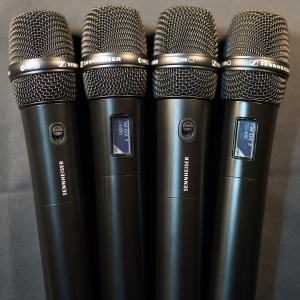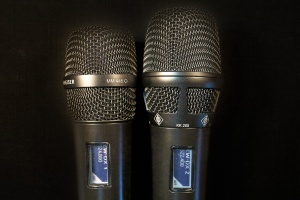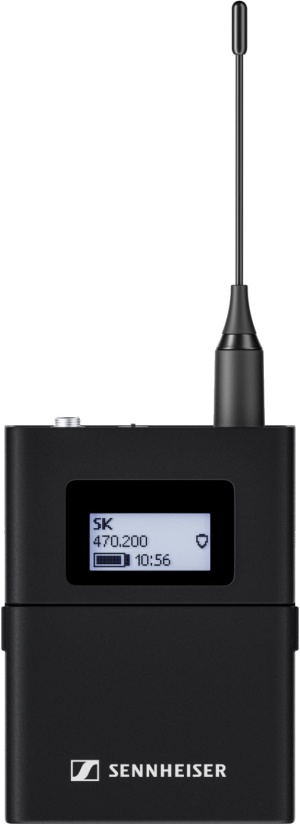Difference between revisions of "Sennheiser Wireless Rack"
m (→= KK 205 and MM 445) |
m |
||
| (8 intermediate revisions by the same user not shown) | |||
| Line 1: | Line 1: | ||
| − | + | {{DivToc | |
| − | + | |RightHead =The Wireless Rack | |
| − | [[File:Sennheiser Wireless Rack 1.jpg| | + | [[File:Sennheiser Wireless Rack 1.jpg|600 px]] |
| − | The rack unit has eight wireless receivers | + | |
| + | |RightBody = The rack unit has eight wireless receivers | ||
* Eight channels in the rack go to the T8S. | * Eight channels in the rack go to the T8S. | ||
*T8S outputs left and right go to T4S Aux 5/6 panned left and right | *T8S outputs left and right go to T4S Aux 5/6 panned left and right | ||
*T4S ToneMatch outputs go to L1 Pro32s. | *T4S ToneMatch outputs go to L1 Pro32s. | ||
* All inputs are panned hard left or hard right. Nothing is panned up the middle. | * All inputs are panned hard left or hard right. Nothing is panned up the middle. | ||
| + | |||
| + | |Categories = | ||
| + | |||
| + | [[Category:How To]] | ||
| + | [[Category:Product to which this applies]] | ||
| + | [[Category:Other]] | ||
| + | }} | ||
| + | |||
| + | |||
Details of the wireless rig. | Details of the wireless rig. | ||
| Line 17: | Line 27: | ||
== T8S and T4S == | == T8S and T4S == | ||
| − | + | ;T8S | |
| + | : Primarily for wireless receivers. | ||
| + | ;T4S | ||
| + | : For additional connections, such as a host headset microphone using the Sennheiser AVX system or emergency wired connections. | ||
=== Connections === | === Connections === | ||
| − | The T8S Main Outputs Left and Right | + | ;Main Outputs |
| + | :The T8S Main Outputs Left and Right connect to the T4S Aux Inputs 5/6 (panned hard left and right) using 1/4 inch (6.3 mm) Tip-Ring-Sleeve balanced cables. | ||
| + | |||
| + | :The T4S ToneMatch ports connect to two L1 Pro32 systems using 50-foot (15-meter) CAT-7 cables. These are heavy-duty, shielded Outdoor Cat 7 Ethernet Cables (26AWG), preferred for their durability on stage. Lighter-duty cables can also be used. | ||
| − | |||
=== T8S Noise Gate === | === T8S Noise Gate === | ||
| − | + | ;Settings | |
| − | + | :The T8S Comp/Gate | Noise Gate is set with an aggressive -35 dB threshold. This setting shuts down each microphone when not in use, minimizing feedback and stage bleed from open microphones. | |
| − | |||
== The Microphones == | == The Microphones == | ||
=== MMD 935 === | === MMD 935 === | ||
| − | [[File:MMD 935.jpg| | + | [[File:MMD 935.jpg|thumb|MMD 935 Capsules]] |
| + | ;Type | ||
| + | :Sennheiser MM 935 capsules, the wireless version of the Evolution 935 microphones. | ||
| − | + | ;Pattern | |
| − | + | :Cardioid, suitable for less experienced vocalists who may not have the mic technique or discipline to stay on pattern for more directional microphones like supercardioid or hypercardioid (e.g., Sennheiser 965, Sennheiser MD 445, Neumann KMS 105). | |
| − | |||
=== KK 205 and MM 445 === | === KK 205 and MM 445 === | ||
| − | [[File:KK 205 MM 445.jpg| | + | [[File:KK 205 MM 445.jpg|thumb|MM 445 and KK 205 Capsules]] |
| − | + | ||
| − | + | ;Neumann KK205 | |
| + | :Used for quieter gigs to create an intimate feel. It is the wireless capsule version of the wired Neumann KMS 105. | ||
| + | ;Sennheiser MMD 445 | ||
| + | :Preferred for loud shows, especially with backline amps or acoustic drums on stage. | ||
| + | |||
| + | == Other Wireless Receivers == | ||
| + | [[File:EW-DX SK.jpg|thumb|EW-DX SK bodypack transmitter]] | ||
| + | |||
| + | ;Usage | ||
| + | :Depending on the number of microphones, the setup includes | ||
| + | * 2 [https://www.sennheiser.com/en-us/catalog/products/wireless-systems/ew-dx-sk/ew-dx-sk-q1-9-509384 EW-DX SK] bodypack transmitters | ||
| + | * 2 [https://www.sennheiser.com/en-us/catalog/products/wireless-systems/ew-d-sk/ew-d-sk-s1-7-508783 EW-D SK] bodypack transmitters | ||
| + | |||
| + | ;Purpose | ||
| + | :These are used for instrument inputs like guitars, basses, or keyboards. | ||
Latest revision as of 00:21, 25 August 2024
Details of the wireless rig.
- 4 x Sennheiser EW-D EM (single channel receivers = 4 channels)
- 2 x Sennheiser EW-DX EM 2 (dual receivers = 4 channels)
- Sennheiser EW-ASA (antenna splitter)
- Front panel antenna kit with 1/2 wave dipole antennas
- To be added: Another antenna splitter and external antennas, but for now, this is performing exceedingly well
T8S and T4S
- T8S
- Primarily for wireless receivers.
- T4S
- For additional connections, such as a host headset microphone using the Sennheiser AVX system or emergency wired connections.
Connections
- Main Outputs
- The T8S Main Outputs Left and Right connect to the T4S Aux Inputs 5/6 (panned hard left and right) using 1/4 inch (6.3 mm) Tip-Ring-Sleeve balanced cables.
- The T4S ToneMatch ports connect to two L1 Pro32 systems using 50-foot (15-meter) CAT-7 cables. These are heavy-duty, shielded Outdoor Cat 7 Ethernet Cables (26AWG), preferred for their durability on stage. Lighter-duty cables can also be used.
T8S Noise Gate
- Settings
- The T8S Comp/Gate | Noise Gate is set with an aggressive -35 dB threshold. This setting shuts down each microphone when not in use, minimizing feedback and stage bleed from open microphones.
The Microphones
MMD 935
- Type
- Sennheiser MM 935 capsules, the wireless version of the Evolution 935 microphones.
- Pattern
- Cardioid, suitable for less experienced vocalists who may not have the mic technique or discipline to stay on pattern for more directional microphones like supercardioid or hypercardioid (e.g., Sennheiser 965, Sennheiser MD 445, Neumann KMS 105).
KK 205 and MM 445
- Neumann KK205
- Used for quieter gigs to create an intimate feel. It is the wireless capsule version of the wired Neumann KMS 105.
- Sennheiser MMD 445
- Preferred for loud shows, especially with backline amps or acoustic drums on stage.
Other Wireless Receivers
- Usage
- Depending on the number of microphones, the setup includes
- Purpose
- These are used for instrument inputs like guitars, basses, or keyboards.



